With 2015 seeing the resurgence of rhythm-action heavyweights ‘Rock Band’ and ‘Guitar Hero’, it was only natural that other games of a similar style would soon arrive in their wake to take a bite out of the rejuvenated interest. Arriving from developers Nurijoy, their newest title Superbeat Xonic – yeah, I can’t pronounce it either – has launched exclusively on the Playstation Vita and aims to bring bite-sized beat-smashing into the palms of your hands. While on occasion there is some fun to be had here, albeit in short bursts, Superbeat fails to implement its ideas at a consistent level of excellence. For every fun moment that comes about, there’s several frustrating ones to follow, and before you know it you’ll be giving up on this experience entirely.
While the gameplay on offer isn’t far removed from the likes of Guitar Hero, Superbeat Xonic adds enough variety and depth in its offerings to keep things interesting and feeling fresh as you work your way up the skill ladder. With three options available to the player: “4 Trax”, “6 Trax”, and “6 Trax FX” – each playstyle brings different ways of interacting with the music, and ultimately makes things more simple or complex for the player. The jumps in difficulty between each style is significant enough to take players out of their comfort zone, but they build off the basic foundation meaning that players feel familiar with what they are experiencing despite the bigger challenge. Though the more complex playstyles may feel overwhelming at first, the more time put into the basic experience (“4 Trax”), the easier it is to get to grips with the new challenges. Put the time in, and you’ll soon feel confident enough to attempt the harder options.
With notes appearing from the centre of the screen and moving outwards towards the ‘judgement gear’ – the game’s fancy term for the area in which you must hit the notes – players must judge their timing correctly and score as many points as possible. With notes moving to both the left and right areas of the screen it can become very difficult to judge the timings of notes properly as you endlessly and uncomfortably stare at the centre of the screen in order to see what is coming. During fast-paced passages of notes you’ll dare not look away for one second, let alone blink at the fear of missing a series of notes. In such circumstances players must instead put all trust in themselves and their ability to follow the beat, but during complex instrumentation this is a feat that is easier said than done.
In order to hit the notes players must use the corresponding buttons on whichever side of the device the notes move towards. Notes on the left are controlled by the D-Pad, the left stick, and the L button, while the opposite side is controlled by the face buttons, the right stick, and the R button. As with other rhythm-action titles, each type of note is assigned to a particular control on the device, and thankfully they’re quick to identify and the control methods are easy to learn.
Though the general concept is great on paper and is occasionally fantastic in action, unfortunately the game suffers from poor implementation of notes and these gameplay mechanics in a large amount of instances. Most notably the biggest problem is found within the use of the analog stick as an input method where during fast-paced segments in particular it becomes clumsy to use. Making the transition from the buttons above to the stick below often threw me off balance and ruined my flow. During slower moments the implementation works as the lessened pace reduces any sense of panic during transitions, but when the notes fly at you thick-and-fast you’ll find it very hard to cope and score those much-needed notes. Alternative control methods can be done through the use of the touchscreen, but unfortunately they don’t do anything to relieve this particular issue. If anything, controlling the game through the use of touchscreen taps and gestures lacks the precision and feedback found in the use of the buttons. Unless you are a masochist, I would advise to stay away from this option.
Aside from the control aspect, implementation of the notes just doesn’t seem well purposed all that often, and it can be very difficult to digest and then hit the notes coming towards you. Many times have I found myself going into total brain meltdown as I was showered with a barrage of notes and failed to compute any of them before it was too late. Though typically the “4 Trax” mode provides a much tamer challenge, the step-ups from that mode offer wildly different experiences that prove far more difficult. Though practice will undoubtedly tighten the players ability, a good amount of the songs just feel utterly ridiculous in their assault of notes, and fail to take in much consideration for player reaction times. Not only this, but at times the game will carelessly throw an odd analog note in amongst a passage of regular notes where the transition just doesn’t work, nor can be timed correctly. 12 year-old kids hopped up on Red Bull and Vimto would undoubtedly struggle with these aspects too, and I believe that says a lot!
Though tracks can be slowed-down (and sped-up) at any time before or during a track, this solves the reflex problem but then opens up a problem in itself – the game just isn’t fun when brought down to a crawl. Superbeat is at its finest when the speed is high and the flow isn’t too difficult to handle, but it’s just not very often that these two qualities join hand-to-hand. Note placement just feels ill-conceived on a number of tracks and on every occasion it is frustrating and considerably dampens the whole experience. It’s a real shame, because when it does get the right balance and the notes are well implemented, it’s very easy to spend short-bursts of time on this game and walk away with a smile.
Reading what notes are coming can be an issue too regardless of the speed, and none of this is helped by the background visuals which can interfere and dominate the picture. It doesn’t happen too often, but it is incredibly off-putting when the notes begin to blend into the background visuals, or your eyes become distracted by the flashing images and bursts of colour. Not only this, but because of the way in which the notes split off onto different sides of the screen, it can become difficult at times to determine the order of notes in regards to which needs to be hit first in a sequence. Thankfully, to almost counter the issues with moments of troublesome timing and high-speed, the game actually offers more leeway in terms of timing and players don’t have to hit the notes at the exact correct moment to score a hit. That said however, dishing out moments of precise beat-smashing does yield much higher points per success and will add to the players ‘Fever’ meter – essentially this games version of the Star Meter/Overdrive found in Guitar Hero and Rock Band respectively. Once Fever has been activated each beat judgement is worth considerably more, however this phase is ended should the player miss a note. Fever can be tricky to earn across each and every track, but it certainly gives more than enough reward for those players who concentrate and follow the music as best as possible.
Being able to hit as many notes as you can is not just key to racking up a high-score, but also guarantees successful completion of the track. With a ‘Power Gauge’ located at the top of the screen, players must be mindful that they maintain a solid performance as each missed note (known as a ‘break’) will decrease the bar accordingly. Playing notes correctly does thankfully add power back into the gauge, so there’s always the opportunity to recover after a bad spell.
The core experience of Superbeat, and where you are likely to spend most of your time – the ‘Stage’ mode allows you to select from one of the aforementioned playstyles, and then play individual sets of three songs that are chosen by yourself. Unless you are using the ‘Freestyle’ mode you are not able to simply select and play individual tracks, but it’s always a neat idea to build a short playlist. Reinforcing the games suitability towards short-bursts of play, playing through short sets feels at home on a handheld, and is nice time-killer. With 30+ songs to choose from there’s a fair amount of variety on offer within the games tracklist. Ranging from Electro House, K-Pop, Easy Listening, Sludge Metal, and everything in between – it’s a bizarre mixture of styles that isn’t cohesive in the slightest, but the vast differences between the genres makes things fairly interesting. It’s just a shame that the tracks are as memorable as they are recognisable, and you’re unlikely to walk away and remember a single one. With it being an indie title, I naturally wasn’t expecting any huge club anthems or chart hits, but what you do get is a series of average tracks that fail to make much of an impact. These tracks and the challenge they pose can be spiced up with the ability to alter the playing speed and put some handicaps in place for those who are feeling daring, but these methods can make things far too crazy for many – especially when the original gameplay can be chaotic enough.
Successfully completing songs awards you with a sum of experience points which contributes to an ever-present levelling system. As you would expect, high-scores translate to higher experience payoffs making your hard efforts with the game feel worth it. Each time a new level is achieved you are commonly rewarded with either a new song, or a new DJ to play as that serve as welcome bonuses for doing well at the game. Providing extra passive abilities, the DJ system is an okay touch but is ultimately something that I never bothered all that much with. With a tonne of these characters to unlock, bonuses that didn’t seem significant enough, and not a whole lot of variety within the roster, I never felt compelled to bother swapping out my DJ’s regularly.
With the levelling system being connected over the entire game, at certain level milestones the player will unlock new content within Superbeat’s ‘World Tour’ mode. Presenting a structure that should be familiar to anybody who’s played a rhythm-action ‘career’ mode before, you are presented with a series of different club venues to play at, each with setlists of ranging difficulties featuring predetermined tracks that you must complete in order to be successful. Where this game tries to make things a little more interesting is by assigning each set with a particular goal that must be completed in order to pass the stage. Such goals translate into familiar territory such as “hitting at least X% of notes overall”, or “not missing any more than X notes overall”, though completion of such tasks is made harder by the occasional use of the aforementioned handicaps. While I do appreciate the developers for wanting to deliver on an experience that differed from the ‘Stage’ mode and actively forcing players into tough and demanding scenarios, sometimes these goals can be outright fiendish. One such handicap in particular continues to be the bane of my life by making notes fade in later than normal, greatly reducing the reaction time window of the player. With the game throwing any consideration for player reaction times out of the window to begin with, this handicap will be sure to make you rage quit. Not even slowing down the tracks to a crawl helps to remedy this situation all that much, and you’re likely to find yourself failing the sets over and over again. To make things even more frustrating, players must repeat the entire set from start to finish when they fail, an infuriating task to repeat especially when it’s just the one song causing the issue.
Verdict
Superbeat Xonic is a game that can provide occasional glimmers of genuine fun and joy, but often you are battered with sloppy implementation and a serious lack of player consideration. All too often will you find yourself getting frustrated as you attempt to deal with a barrage of notes that feel nigh-on impossible to react to. There’s one thing being required to be skilled at this game, and then there’s being required to bear super-human reflexes, and unfortunately the game relies too heavily on the latter. When provided with songs that can be easily read and its notes realistically hit, the games systems work together and there’s fun to be had, but unfortunately this balance is not often found. With interesting rhythm mechanics, a wealth of content, and different ways of spicing up and expanding on the core experience, all is not lost with this game – it’s just a shame that the challenge is so damn high and will put off a lot of players!
Disclaimer:All scores given within our reviews are based on the artist’s personal opinion; this should in no way impede your decision to purchase the game.


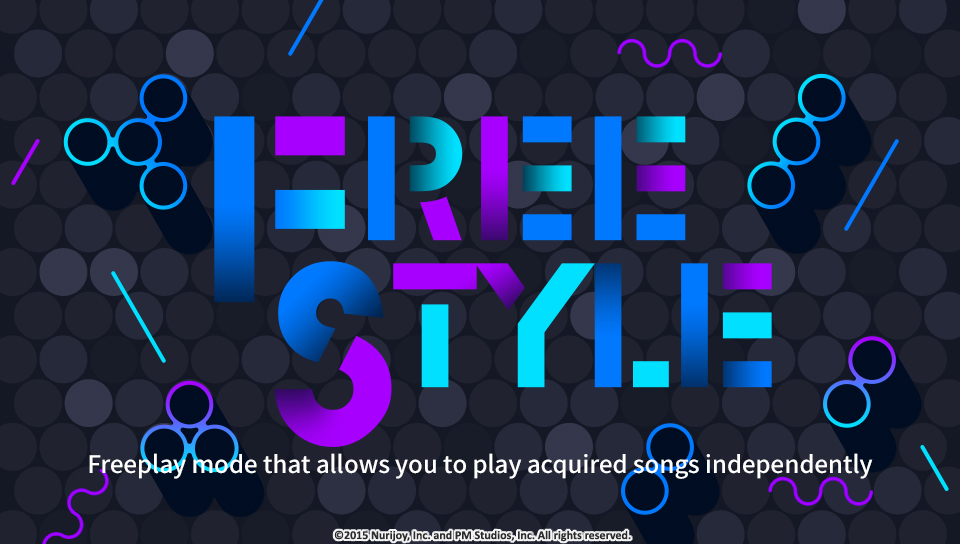
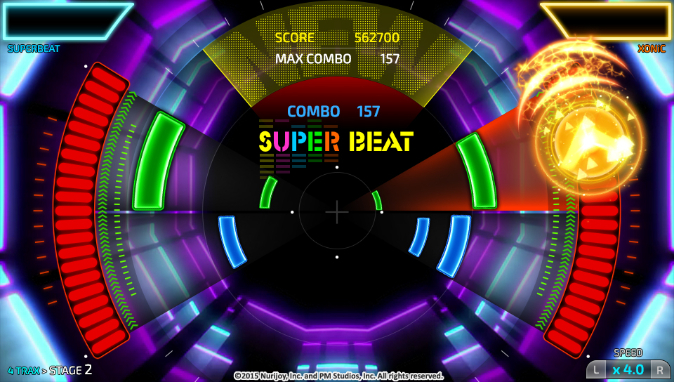
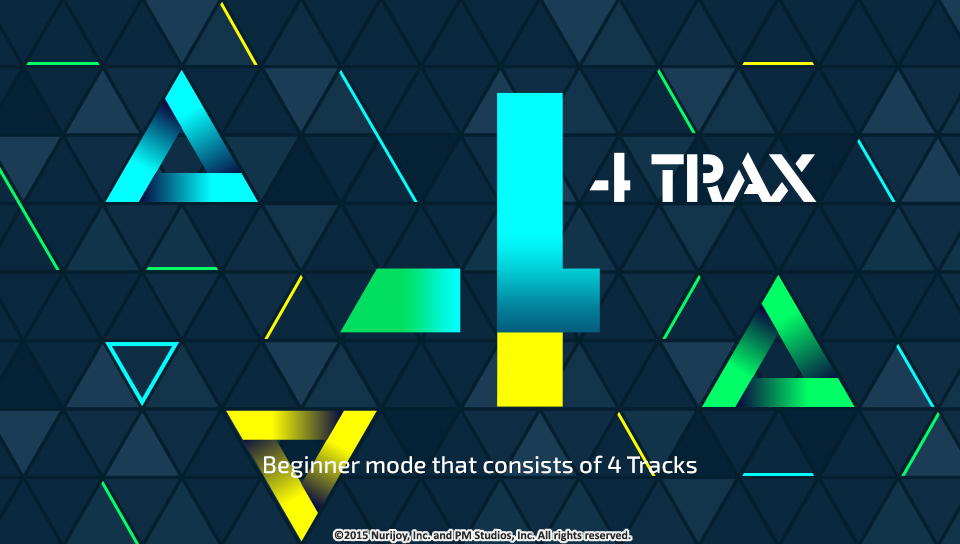

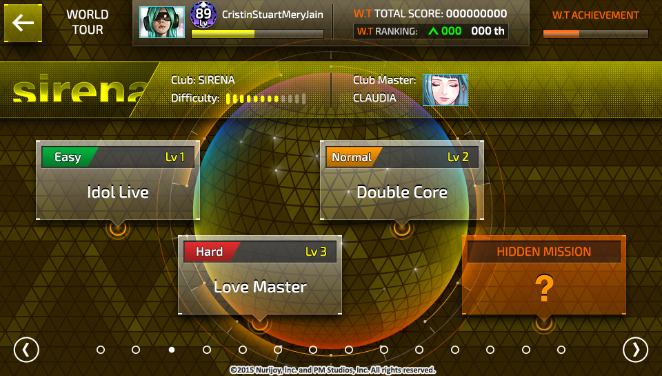



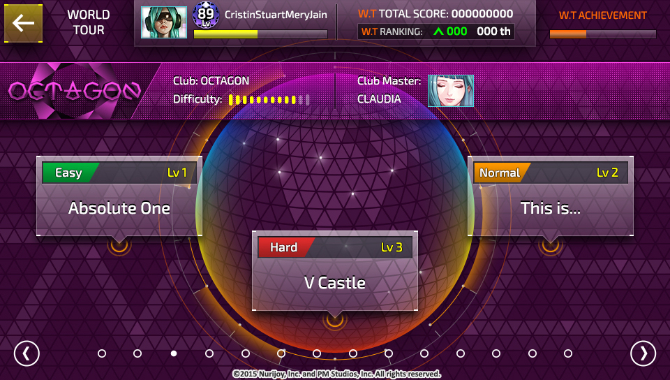
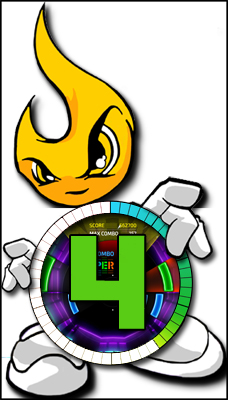






You must be logged in to post a comment.